The AMD Ryzen 5 1600X vs Core i5 Review: Twelve Threads vs Four at $250
by Ian Cutress on April 11, 2017 9:00 AM ESTBenchmarking Performance: CPU Encoding Tests
One of the interesting elements on modern processors is encoding performance. This includes encryption/decryption, as well as video transcoding from one video format to another. In the encrypt/decrypt scenario, this remains pertinent to on-the-fly encryption of sensitive data - a process by which more modern devices are leaning to for software security. Video transcoding as a tool to adjust the quality, file size and resolution of a video file has boomed in recent years, such as providing the optimum video for devices before consumption, or for game streamers who are wanting to upload the output from their video camera in real-time. As we move into live 3D video, this task will only get more strenuous, and it turns out that the performance of certain algorithms is a function of the input/output of the content.
7-Zip
One of the freeware compression tools that offers good scaling performance between processors is 7-Zip. It runs under an open-source licence, is fast, and easy to use tool for power users. We run the benchmark mode via the command line for four loops and take the output score.
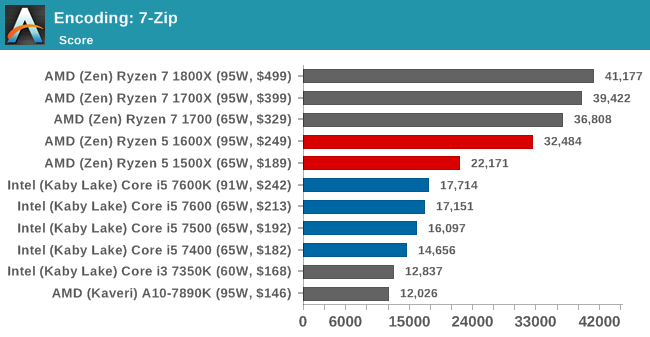
WinRAR 5.40
For the 2017 test suite, we move to the latest version of WinRAR in our compression test. WinRAR in some quarters is more user friendly that 7-Zip, hence its inclusion. Rather than use a benchmark mode as we did with 7-Zip, here we take a set of files representative of a generic stack (33 video files in 1.37 GB, 2834 smaller website files in 370 folders in 150 MB) of compressible and incompressible formats. The results shown are the time taken to encode the file. Due to DRAM caching, we run the test 10 times and take the average of the last five runs when the benchmark is in a steady state.
AES Encoding
Algorithms using AES coding have spread far and wide as a ubiquitous tool for encryption. Again, this is another CPU limited test, and modern CPUs have special AES pathways to accelerate their performance. We often see scaling in both frequency and cores with this benchmark. We use the latest version of TrueCrypt and run its benchmark mode over 1GB of in-DRAM data. Results shown are the GB/s average of encryption and decryption.
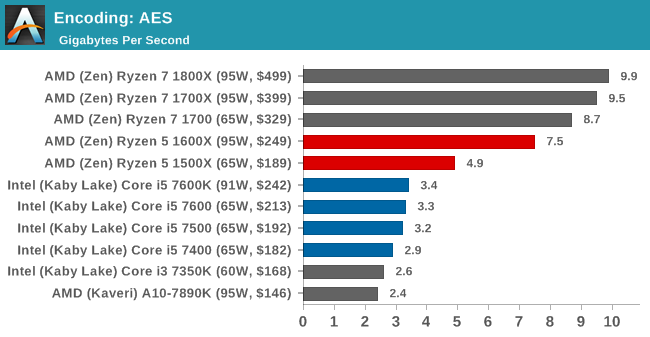
HandBrake H264 and HEVC
As mentioned above, video transcoding (both encode and decode) is a hot topic in performance metrics as more and more content is being created. First consideration is the standard in which the video is encoded, which can be lossless or lossy, trade performance for file-size, trade quality for file-size, or all of the above can increase encoding rates to help accelerate decoding rates. Alongside Google's favorite codec, VP9, there are two others that are taking hold: H264, the older codec, is practically everywhere and is designed to be optimized for 1080p video, and HEVC (or H265) that is aimed to provide the same quality as H264 but at a lower file-size (or better quality for the same size). HEVC is important as 4K is streamed over the air, meaning less bits need to be transferred for the same quality content.
Handbrake is a favored tool for transcoding, and so our test regime takes care of three areas.
Low Quality/Resolution H264: He we transcode a 640x266 H264 rip of a 2 hour film, and change the encoding from Main profile to High profile, using the very-fast preset.
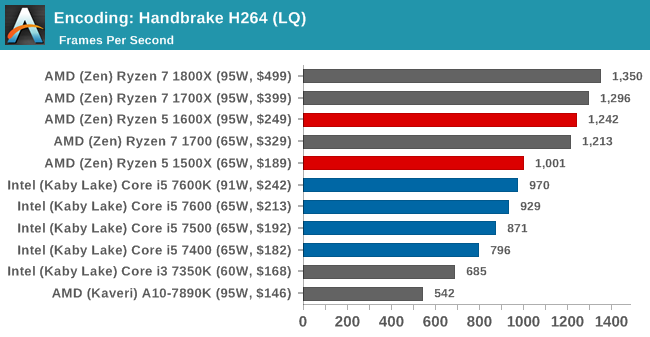
High Quality/Resolution H264: A similar test, but this time we take a ten-minute double 4K (3840x4320) file running at 60 Hz and transcode from Main to High, using the very-fast preset.
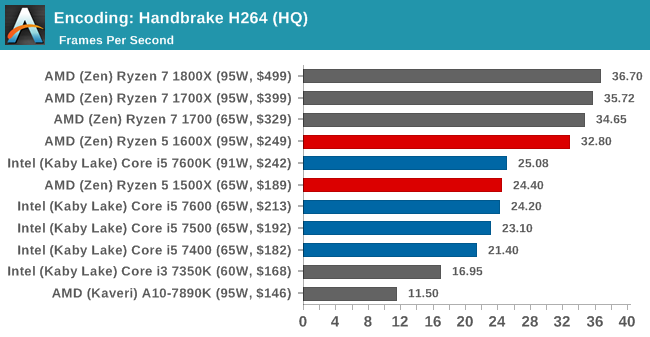
HEVC Test: Using the same video in HQ, we change the resolution and codec of the original video from 4K60 in H264 into 4Kp30 HEVC. This causes a dramatic reduction in filesize (this is a different test to the Ryzen 7 review).
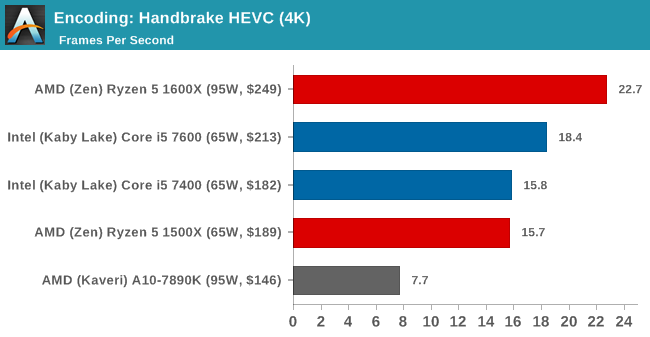


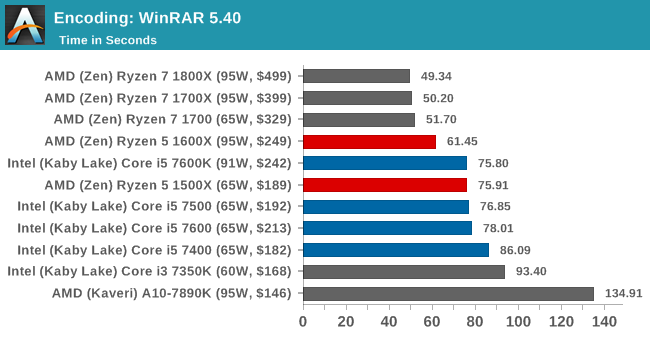








254 Comments
View All Comments
Arbie - Wednesday, April 12, 2017 - link
I agree - this is implying the reverse of what was probably meant. And it's still broken.coder543 - Tuesday, April 11, 2017 - link
"For $250, the top Ryzen 5 1600X gives six cores and twelve threads of AMD’s latest microarchitecture, while $250 will only get you four cores and no extra threads for the same price."You're missing a word in here. That word is "Intel". Right now, the opening paragraph contains one of the most confusing sentences ever written, because the only brand mentioned is AMD, where $250 simultaneously gets you 6 cores and 12 threads *and* only 4 cores? Please update this paragraph to show that Intel only gets you 4 cores.
Arbie - Tuesday, April 11, 2017 - link
I agree - you really need to add "with Intel". This is a theme statement for the entire article and worth fixing.CaedenV - Tuesday, April 11, 2017 - link
Well, that review was surprising.I am looking to re-do my system in the next year or so, and I thought for sure that the R5 would be the no-brainer pick. But that seems not to be the case. If on a tight budget it looks like the i3 is the all-around value king offering great single-thread performance and decent light to moderate gaming. The i5 still reigns king for non-production work while being right about the same price point as the R5. And if doing production work the R7 really makes more sense as it is not that much more expensive while offering much better render performance. I somehow thought that the R5 would be better priced against the i5, just as the R7 stomps all over the i7 chips.
So now when I look at building my next PC the real question is how much production work I plan on doing. If it is a lot then the R7 is the way to go. But if I am just doing media consumption and gaming then perhaps the Intel i5 will still be the best option. Hmm... maybe I'll just wait a bit longer. I mean, my i7 2600 still keeps chugging along and keeping up. The real temptation to upgrade is DDR4, USB-C, m.2, and PCIe v3. Seeing more 10gig Ethernet would also be a big temptation for an upgrade, but I think we are still 2-3 years out on that. Any up-tick in raw CPU performance is really a secondary consideration these days.
snarfbot - Tuesday, April 11, 2017 - link
That is a strange position indeed, as it conflicts with all the data in the review.In other words lol wut?
Meteor2 - Wednesday, April 12, 2017 - link
Indeed. My conclusion was 'wow, AMD have knocked it out of the park'. Same or better gaming, far better production.Cooe - Monday, March 1, 2021 - link
What happened to your "Ryzen 5 will be shit" comments from all over the OG Ryzen 7 review???Drumsticks - Tuesday, April 11, 2017 - link
It's not really hard to figure out. If you just do media and gaming, stick with Intel.If you rely on your home PC for any significant measure of production work, you should probably be buying the most expensive Ryzen chip you can.
gerz1219 - Tuesday, April 11, 2017 - link
Yeah, for the longest time I've maintained separate rigs for gaming and video work, but I'm in the process of building a hybrid machine and the Ryzen 7 chips came out at just the right time. I just ordered an 1800X for my new workstation/gaming/VR rig. Gaming performance is somewhat important to me, but I can handle lower frame rates in certain games versus the 7700K because for my post-production video work, I need those extra cores and threads. For the longest time Intel was able to charge whatever they wanted at the high-end and prices had gotten ridiculous, so the 7-series fills a huge niche.However, it seems less clear where the Ryzen 3 and 5 chips will fit in. People who only use their machines for games won't see very many of the benefits of the Zen architecture, but they're saddled with the weaknesses of relatively slower single-threaded performance, and AMD isn't competing on price.
msroadkill612 - Thursday, April 13, 2017 - link
You did luck out. u r the perfect ryzen demographic.I suspect teamed with a vega 8GB hbm & a pcie ssd, it will blow you away by xmas.
But the 1600 6 core comes close mostly, for $250~ less.